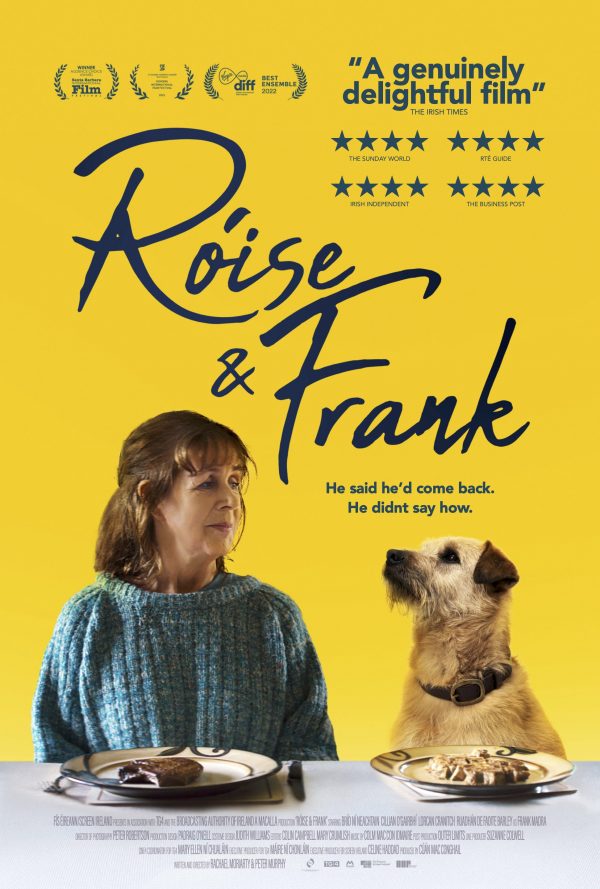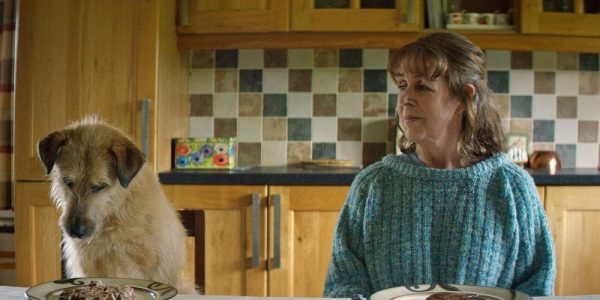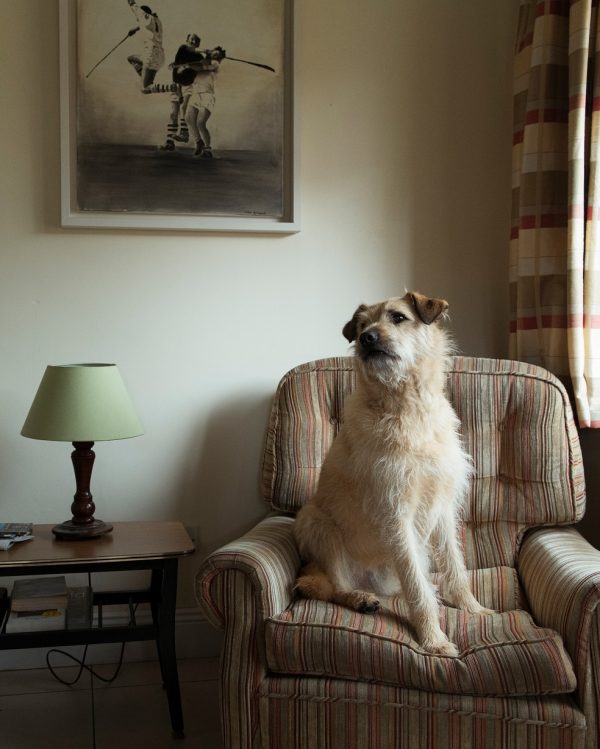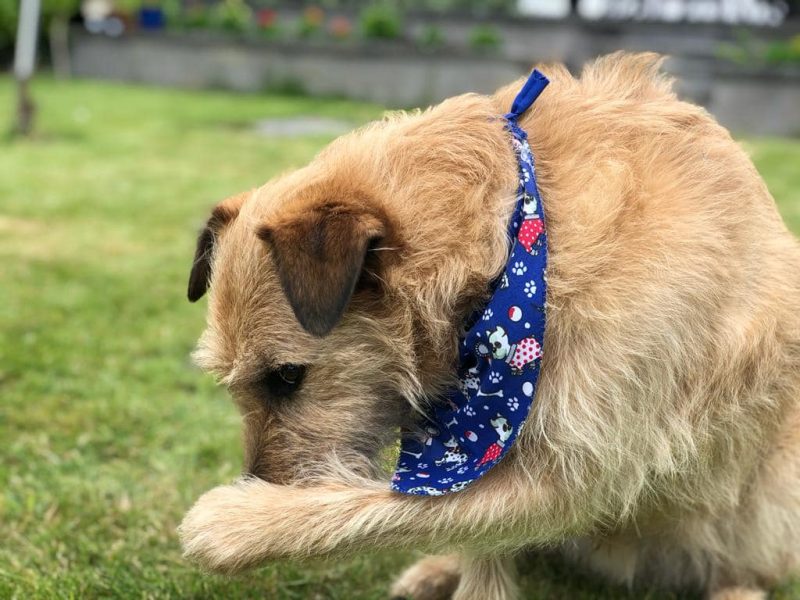‘Róise & Frank’ celebrates undying devotion

“Róise & Frank” (2022 production, 2023 release). Cast: Bríd Ní Neachtain, Cillian O’Gairbhi, Lorcan Cranitch, Ruadhán de Faoite, Michelle Beamish, Seán Mac Gearailt, Cormac Hennessy, Aonghus Og McAnally, Barley the dog. Directors: Rachael Moriarity and Peter Murphy. Screenplay: Rachael Moriarity and Peter Murphy. Web site. Trailer.
Róise’s depressed approach to living has others worried, such as her son, Alan (Cillian O’Gairbhi), a physician who struggles to balance the obligations of his career and as a new father while keeping tabs on mom. His patients who know Róise are concerned, too, frequently asking him how she’s doing, given that she’s largely vanished from their lives. That’s especially true for Róise’s neighbor, Donncha (Lorcan Cranitch), whose interest in her involves more than just her well-being now that she’s single again (even though dating and romance are some of the last things on her mind).
But circumstances change suddenly when an unexpected visitor shows up on her doorstep – a scruffy stray (Barley the dog) who seems to take an unusually strong interest in Róise. She’s initially annoyed by the pooch’s persistence in following her around and engaging in less-than-subtle attempts at ingratiating himself in her life. But Róise soon notices some unusual – and more than a little synchronistic – behavior patterns. For example, when the dog barges into the house, he makes a beeline for the easy chair in which Frank often parked himself. On another occasion, the dog intently scours Alan’s former bedroom to search for a ball that he used when he played in hurling matches, a sport that Frank positively loved. But the clincher comes when the dog bolts out of the house one day and heads straight to the cemetery in the local church yard, running directly to Frank’s grave, where he makes himself comfortable until Róise catches up with him.
When Róise puts all the pieces together, she comes to an astonishing conclusion: The dog is the reincarnation of her late husband. In Róise’s view, these unusual occurrences are just too coincidental to be interpreted any other way. But the cemetery incident seals it for her: When she thinks back to the time when Frank was on his death bed, she recalls the last thing he said to her – that, even though he was dying and moving on to a new plane of existence, their lives together were not over, that the relationship would continue, even if it didn’t take the same form that they had long been accustomed to. And, from her perspective, the dog’s sudden appearance and all of the synchronistic events that have since occurred undeniably confirm his final statement. She’s overjoyed at this prospect, one that significantly lifts her spirits. And she’s so convinced that she’s once again in the company of her beloved husband that she even starts calling the dog by his name, Frank.

Before long, Róise begins to emerge from her protracted sorrow. Alan, Donncha and others are certainly pleased to see the change in her attitude. She even resumes the activities she abandoned, like rejoining the choral group. She also takes an interest in a young neighbor boy, Mikey (Ruadhán de Faoite), a sweet but somewhat geeky lad who longs to be a star hurler but lacks the skills to do so. However, with Frank’s help as an impromptu trainer, and backed by Róise’s zealous encouragement, Mikey soon develops into quite the talented little athlete, much to his peers’ stunned amazement.
Nevertheless, despite the positive reversal in Róise’s attitude, Alan, Donncha and others are concerned about her state of mind. They’re worried about her unshakable belief that the dog is the second coming of Frank. They can’t help but think that perhaps she’s becoming delusional, particularly given the depth of her conviction. They consider various options to urge her to give up this fantasy, some of which verge on interventional efforts. However, Róise remains steadfast in her beliefs, especially in light of what Frank’s presence has done for her and for Mikey. Frank has been a big help to them both, and she’s not ready to give up on that.
When gentle nudges to encourage Róise to change her mind don’t work, more drastic events begin to unfold to prompt her to abandon her “silly superstition.” Troubling circumstances arise where Frank’s safety, freedom and well-being are threatened, such as attempts by the neighborhood veterinarian to intrusively force Frank into getting chipped to comply with local dog ownership mandates. Given everything that Frank has done for her, Róise can’t help but return the favor, intervening on her partner’s behalf. But, when the two become separated, doubts surface about whether they’ll be reunited, conditions that throw matters into crisis at a time when things in Róise’s life had just begun to see an upturn. Will she and Frank get back together again, or is she doomed to return to the fate from which she just escaped? Or is another option possible? Indeed, Frank’s return was unexpected, so maybe there’s a chance that another such surprise might occur.

Róise’s conflicted beliefs would thus appear to have her locked into an irreconcilable existential stalemate. Yet, ironically, her beliefs could also provide the solution to extracting her from this problem. By skillfully drawing upon the power of her beliefs, she could deftly use them to resolve this seemingly insurmountable impasse. That’s because our thoughts, beliefs and intents play a central role in the manifestation of the existence we experience thanks to the conscious creation process, the philosophy that maintains these intangible resources are responsible for the materialization of our reality. It’s not clear how familiar Róise is with this school of thought, but, given how her story ultimately unfolds, it’s apparent that she has a reasonable, if not fully understood, grasp of some of its key principles and makes use of them in changing her destiny, even if she’s not entirely aware of doing so or of how to reach her destination.
Róise’s awareness of these notions emerges gradually, in carefully considered steps, through which she systematically puts the pieces together to arrive at a conclusion that falls into line with her most cherished, deeply held beliefs. That conclusion is largely based on her belief in the promise her husband made to her on his death bed – that their relationship was not at an end and would continue, even if not as expected. And, when she sees how that’s been fulfilled with her new house guest’s mystifying arrival, she sees how Frank her husband has indeed kept his word as Frank the dog.
Coming to this realization rests strongly on Róise’s recognition of all of the various components that went into the creation of this scenario. Perhaps the most significant of these is her keen ability to spot the synchronicities that pop up in her world after the dog’s arrival. She recognizes the meaningful significance of them, especially once they begin appearing regularly. She realizes that, collectively, they can’t be realistically chalked up to “coincidence” or random chance. She understands that these occurrences represent messages that are being sent to her so that she can see the larger pattern of which they’re a part. They thus constitute “clues” to help her recognize and understand what’s unfolding before her eyes. And they all point to Frank, be it in his current canine and formerly human incarnations, as part of keeping his promise.
What’s more, she recognizes that these synchronicities represent the fulfillment of her late husband’s promise with precise specificity. When he said that their relationship would continue after his passing, even if in a different form, events have indeed unfolded in line with that pronouncement. The disparity in the nature of Frank’s different incarnations couldn’t be more readily apparent once recognized, first as a man and then later as a dog. To Róise’s credit, she combines this distinctly singular piece of the puzzle with those connected to the numerous other synchronicities she’s been able to recognize, providing further confirmation of her belief in Frank agreeing to one day fulfill his promise. While Róise may have had to endure her share of emotional distress in reaching this point, she can take comfort now that her deeply held belief has been fully realized, even if not in the anticipated iteration.
Appreciating these realizations is important, not just for Róise but for all of us, because they illustrate how our existence is full of clues to help us understand how and why it materializes as it does. They truly are reflections of our beliefs, showing us how these intangible resources come to constitute the components of the reality we experience. More importantly, however, they help to make us aware that we’re the drivers of those beliefs – and, consequently, the nature of the existence around us, no matter what nature it may encompass, for better or worse.

Frank’s return also shows us how the elements of our existence can be helpful in many ways – and to many people – even if they assume an unlikely form. Given what we know about Frank’s human incarnation, he seems like he was a kind and loving person. And, in reincarnating, we see those qualities repeated, even amplified, in canine form. Not only does he help Róise get over her grief, but he’s also a guardian and protector for her when need be. He also extends his helping paw to Mikey, undoubtedly in much the same way he probably did with his son Alan when Frank was in human form. Now, as a dog, Frank thus plays (or continues to play) the roles of helper, teacher and caregiver, meeting the needs of those who require his assistance and further gaining experience at what his spirit does best, even if from a new perspective, one that’s just as driven by beliefs as when he was in human form?
While a tragedy may have been at the heart of what set this scenario in motion, it nevertheless manages to unfold in fulfilling and satisfying ways for all concerned. All of which goes to show that silver linings lurk where least expected. Uncovering those benefits may call upon us to take a discerning look at our existence, how we arrive at its manifestation and the role we play in that grand process, but doing so provides us with a greater understanding of reality, our place in it, and how we can derive the most from it for our personal and spiritual growth. Who knew that a cute little dog could do so much in helping us learn so much about the fundamental nature of our being.
How refreshing it is to watch a sweet, touching family film without it oozing enough sugary syrup to make even the most hardened stomach nauseous. Such is the case with this warm, loving, heartfelt tale from writer-directors Rachael Moriarity and Peter Murphy, one filled with a series of heart-tugging twists and turns that will positively leave viewers teary-eyed with joy. Despite a few predictable story elements, “Róise & Frank” nevertheless manages to delight in a natural, emotionally grounded way that never seems forced or artificial, thanks to its fine performances, breezy writing, beautiful cinematography of the Irish landscape and affecting original score. This enchanting Gaelic language offering will charm audiences to no end without ever resorting to schmaltz or manipulation, earning every reaction it evokes. Like its adorable four-legged protagonist, this one could indeed leave viewers coming back for more. The film is available for streaming online.
They say there’s no love as great as the kind that comes from a dog. And, given how Frank so freely and readily illustrates this, one can’t help but wonder how many canines like him may, in fact, be the reincarnations of deceased loved ones. Whether or not that’s true, however, we should be grateful for what they give us, no matter how they find their way into our existence. We should give ourselves a well-deserved belly rub or pat on the back for having drawn such devoted four-legged friends into our reality – and be thankful for everything they give us, time after time after time.
Copyright © 2023, by Brent Marchant. All rights reserved.



